VÁCLAV "VENCA" PROCHÁZKA
- BIKE MECHANIC -
There is a story behind every pair of hands that touch our frames during the production process. Being ten years old in 2021, we would like to tell you the stories of ten Festka key personnel in our blog in the next weeks and months.
Let's start with a particularly colourful one, that of our mechanic and bike builder Václav “Venca” Procházka.

You and cycling – what's the story?
I remember being around bikes since an early age but it was my brother who introduced me to competitive cycling. I joined a club in 1978 when I was 15 and was lucky to have got into the hands of a good coach. He gave us hard time on the road but he also taught us how to look after our bikes: fix spokes, patch up tubes, fine-tune the shifting… We were all able to service our bikes ourselves at home. I tinkered with bikes for as long as I remember. And because I grew up near Rokycany, my default path led to Favorit (a leading Czech bike manufacturer).
What bikes did you ride as boys?
I had a Favorit with Campagnolo front and rear mech which actually got me disqualified at the national "Looking for a World Champion" race. In those totalitarian times, all your equipment had to be Czech made.
Tell me about your racing career.
After some years spent with two top junior teams, I joined ZVVZ Milevsko which was a proper racing team. In those days top sportspeople couldn’t be officially professional but practically they were. Teams were sponsored by state-owned businesses who had sportspeople on their payroll as whatever their official profession was – welders, cabinetmakers, teachers, what have you – but all they did was train and compete. I only spent a couple of years there before I had to go and do my national service during which I mostly trained and raced bikes in a team run by the military. After that, I went back to Favorit where I both raced and worked on various positions until I stopped racing in 1993. My last race was a Criterium in Rokycany on May 13. Two days later I moved to the town of Sušice to take up the job of a bike mechanic in a bike shop operated by someone I knew there.
How did you cross paths with Festka? Or let me rephrase the question: how did you and Michael Moureček meet?
There was no cycling team in Sušice so the owner of the bike shop where I worked and I started one. The first Moureček I met was Michael's dad who walked in one day looking for a bike for his son. The bike he had was too big for him. When Michael came in a few days later he started asking lots of questions about bikes and racing. He was very keen and very determined and I began to coach him. A few years later, in 1998, he was drafted to Dukla Praha, the best cycling team in the country, attached to the Czech military, and managed to win the Junior Peace Race in the same year. He then spent two years with a pro team in Italy and when he came back to rejoin Dukla, he asked me to come and work there in a joint role as bike mechanic and soigneur. As my marriage had just broken down, it was a good opportunity for a change so I went. I worked both at the national and international level – stage races in Europe and even China. I also worked with the national track team.

With the 17-year old Michael Moureček in the Jiko Čácha Sušice team jersey
Did you witness any major achievements by Czech riders?
I was there when Alois Kaňkovský won the World's in the Omnium in Mallorca in 2007. The Omnium is specific in that you change the bars and gears for each discipline. There was no time for him to test the bike before the decisive event. I put it in the stand and started to pray. My pulse must have been at 200. If something went wrong with the bike it would have killed his chances for the title. I breathed a huge sigh of relief when he went around the first time and everything was ok. The rider must be able to trust you completely and you must never let him down.

With the newly crowned World Champion Alois Kaňkovský.
I did two Olympics. In Beijing, I looked after Roman Kreuziger's bike. He rode for Liquigas at the time and had a brand new Cannondale. I spent a whole day removing decals from it to make the bike comply with the olympic rules on advertising. In London, I worked for track and BMX riders. I did more than 60 six-day events between 2004 and 2017. The same merry-go-round every year: Dortmund, Munich, Zurich, Rotterdam, Bremen, Berlin, Copenhagen…

London Olympic Games, 2012.
Can you describe a typical day in the life of a bike mechanic during a stage race?
The crucial difference is whether the previous day was wet or dry. If the race starts at 10 AM, you have to get up at six, eat some breakfast and hurry to the team cars or bus. You need to top up the tires, attach race numbers and chips. To do it all well will take you 45 minutes. If the previous day was wet, the bikes will have been only washed and checked briefly and need finishing now. As soon as you're done with that you transport the bikes to the start in a van and transfer them them onto the team car: four bikes and five pairs of spare wheels per car. When the race starts you have a moment of calm but I can tell you with my conscience clear that I had never slept in the team car in the seventeen or so years I worked as a mechanic.
The minute you hear "CRASH" on the radio, all hell breaks loose. When the organisers report the race numbers of those who went down you know which bikes to get – you got them arranged on the roof from right to left in the order of your riders' position in the overall standings. You grab tools you think you're gonna need from a holder in front of you. You know you're likely to have to run back to get a spare bike but you don't take it straight away as it would only get in the way. What you always take, though, are spare wheels. The rider prepares for the wheel change by shifting to the big ring and the smallest sprocket, he may unlock the brake, too, but that's all. As soon as the rider is back in the saddle you run back to the car. After the race you have to clean and check all the bikes again. If the day was wet it may take you till the small hours. And again and again. I'm really glad I had stopped before disc brakes came because they make the wheel change much longer and trickier.
How long can one cope with this?
That's the big question… As time goes by you start to realise how little downtime you have. You travel all the time and it becomes more and more tiring. And you start to lose touch because you only work with one type of material. You get stuck in a rut. A new piece of equipment lands in your hands and you don't know what to do with it. But it's the constant travel that eventually brings you down. All of a sudden you realise you'd been working two and a half months solid. Saturdays, Sundays…
Let’s go back to Festka and Michael…
Mauri (that's what most people call Michael Moureček) gave up competitive cycling in 2006. After that, I'd see him around at Dukla when he stopped by to watch a race or get something fixed on his bike. Our paths were pretty separate for many years. But when, in 2016, my second wife and I decided to take a child into foster care, I knew I had to give up the life on the road and devote more of my time to the family. Michael had told me to come and work for Festka previously but I always laughed it off. This time it was me who was doing the asking and luckily the time was right.
I got to try my hand at various stages of frame production – from sanding to filling to finishing – but now I work here as a mechanic and bike builder mostly. It's a good challenge and an opportunity to keep on the cutting edge of bike technology and prove to myself that I'm not too old to learn new tricks.
Don't you miss the atmosphere of a bike race?
I do but I don't miss the travel and the stress. Or the need to work till one, two in the morning if it had rained on the race. Although, some of the builds I get to do at Festka would also qualify as an adrenalin sport. Like the one I'm building now: Look cranks, SRM/Carbon-Ti rings, Sram front mech, Ceramic Speed rear mech cage… You can't build a bike like that before lunch. Sometimes it takes as long as two days to put it together and make it all work the way it should.
Do you ever find time to ride?
I do. Mostly on weekends and only when the weather is nice. Two hours on average, forty, sixty kilometers. Not that I wouldn't manage a century but I don't need to prove anything anymore.
What's your take on Festka?
I jumped on an already running train. And the train was running pretty fast. I have a lot of respect for the people who work here. Like Michal Hložek who cuts and miters the tubes and puts the frames together. He's so precise! When he's here, you can be sure all the problems that may crop up when prototyping frames will get solved. He had to quarantine for a fortnight because of covid and you can't imagine how much he was missed.
Festka is ten years old in 2021. What would you wish her?
Customers who love cycling. And bikes that will continue to make their owners happy.
written by: Jan Krofta
photo: Jan Krofta, Vaclav Prochazka personal archive


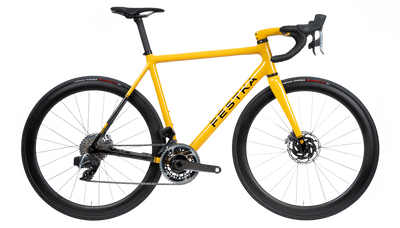
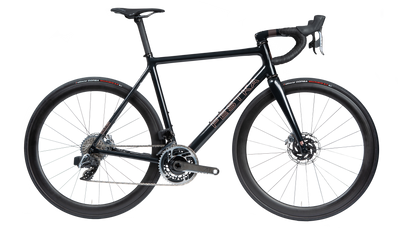
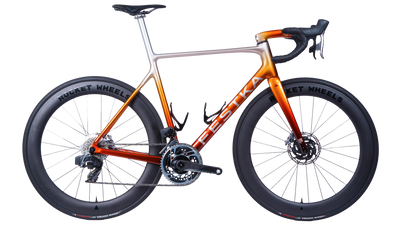
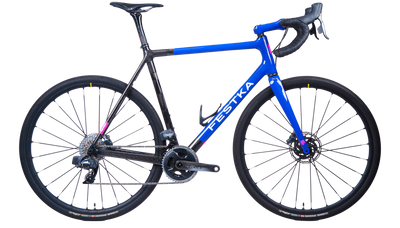
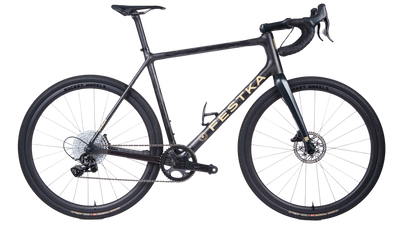



Leave a comment